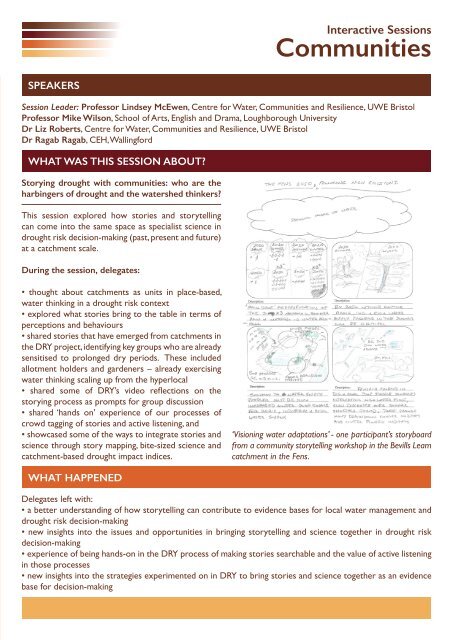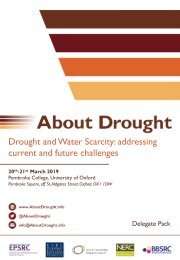About Drought Showcase Review (Post-Event)
Create successful ePaper yourself
Turn your PDF publications into a flip-book with our unique Google optimized e-Paper software.
Interactive Sessions<br />
Communities<br />
SPEAKERS<br />
Session Leader: Professor Lindsey McEwen, Centre for Water, Communities and Resilience, UWE Bristol<br />
Professor Mike Wilson, School of Arts, English and Drama, Loughborough University<br />
Dr Liz Roberts, Centre for Water, Communities and Resilience, UWE Bristol<br />
Dr Ragab Ragab, CEH, Wallingford<br />
WHAT WAS THIS SESSION ABOUT?<br />
Storying drought with communities: who are the<br />
harbingers of drought and the watershed thinkers?<br />
This session explored how stories and storytelling<br />
can come into the same space as specialist science in<br />
drought risk decision-making (past, present and future)<br />
at a catchment scale.<br />
During the session, delegates:<br />
• thought about catchments as units in place-based,<br />
water thinking in a drought risk context<br />
• explored what stories bring to the table in terms of<br />
perceptions and behaviours<br />
• shared stories that have emerged from catchments in<br />
the DRY project, identifying key groups who are already<br />
sensitised to prolonged dry periods. These included<br />
allotment holders and gardeners – already exercising<br />
water thinking scaling up from the hyperlocal<br />
• shared some of DRY’s video reflections on the<br />
storying process as prompts for group discussion<br />
• shared ‘hands on’ experience of our processes of<br />
crowd tagging of stories and active listening, and<br />
• showcased some of the ways to integrate stories and<br />
science through story mapping, bite-sized science and<br />
catchment-based drought impact indices.<br />
‘Visioning water adaptations’ - one participant’s storyboard<br />
from a community storytelling workshop in the Bevills Leam<br />
catchment in the Fens.<br />
WHAT HAPPENED<br />
Delegates left with:<br />
• a better understanding of how storytelling can contribute to evidence bases for local water management and<br />
drought risk decision-making<br />
• new insights into the issues and opportunities in bringing storytelling and science together in drought risk<br />
decision-making<br />
• experience of being hands-on in the DRY process of making stories searchable and the value of active listening<br />
in those processes<br />
• new insights into the strategies experimented on in DRY to bring stories and science together as an evidence<br />
base for decision-making<br />
147



